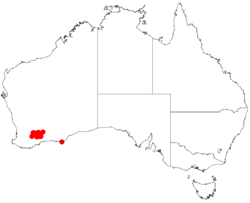Biology:Acacia chrysopoda
| Acacia chrysopoda | |
|---|---|
| Scientific classification | |
| Kingdom: | Plantae |
| Clade: | Tracheophytes |
| Clade: | Angiosperms |
| Clade: | Eudicots |
| Clade: | Rosids |
| Order: | Fabales |
| Family: | Fabaceae |
| Subfamily: | Caesalpinioideae |
| Clade: | Mimosoid clade |
| Genus: | Acacia |
| Species: | A. chrysopoda
|
| Binomial name | |
| Acacia chrysopoda Maiden & Blakely
| |

| |
| Occurrence data from AVH | |
Acacia chrysopoda is a shrub of the genus Acacia and the subgenus Plurinerves that is endemic to an area of south western Australia .
Description
The compact dense shrub typically grows to a height of 0.3 to 1.0 metre (1 to 3 ft).[1] It has branchlets that are covered in golden or white coloured hairs on young growth. Like most species of Acacia it has phyllodes rather than true leaves. The grey-green coloured phyllodes are crowded at the ends of the branchlets and have a linear to linear-oblanceolate shape. The phyllodes have a length of 1 to 2 cm (0.39 to 0.79 in) and a width of 1 to 2 mm (0.039 to 0.079 in) with one to three indistinct main longitudinal nerves.[2] It blooms in July and produces yellow flowers.[1] The simple inflorescences occur singly or in pairs in the axils and have spherical flower-heads with a diameter of 5 to 6 mm (0.20 to 0.24 in) containing 30 to 45 light golden coloured flowers. Following flowering thin leathery seed pods form that have a linear to narrowly oblong shape but are curved and undulate with a length of 2 to 3.5 cm (0.79 to 1.38 in) and a width of 3 to 4 mm (0.12 to 0.16 in).[2]
Taxonomy
The species was first formally described in 1928 by the botanists Joseph Maiden and William Blakely as part of the work Descriptions of fifty new species and six varieties of western and northern Australian Acacias, and notes on four other species as published in the Journal of the Royal Society of Western Australia. It was reclassified as Racosperma chrysopodum by Leslie Pedley in 2003 then transferred back to genus Acacia in 2006.[3]
Distribution
It is native to an area in the Wheatbelt and Goldfields-Esperance regions of Western Australia growing in sandy, clay or loamy granitic soils.[1] The shrub has a limited distribution extending from around Karlgarin in the west to around Lake Cronin in the east and to around Newdegate and Lake King where it is usually a part of Eucalyptus woodland communities.[2]
See also
References
- ↑ Jump up to: 1.0 1.1 1.2 "Acacia chrysopoda". FloraBase. Western Australian Government Department of Parks and Wildlife. https://florabase.dpaw.wa.gov.au/browse/profile/3259.
- ↑ Jump up to: 2.0 2.1 2.2 "Acacia chrysopoda". World Wide Wattle. Western Australian Herbarium. http://worldwidewattle.com/speciesgallery/chrysopoda.php. Retrieved 18 October 2020.
- ↑ "Acacia chrysopoda Maiden & Blakely". Atlas of Living Australia. Global Biodiversity Information Facility. https://bie.ala.org.au/species/https://id.biodiversity.org.au/node/apni/2901476#names. Retrieved 19 October 2020.
Wikidata ☰ Q9563345 entry
 |

